 When you are running a growing business, there never seems to be enough hours in the day to get things done.
When you are running a growing business, there never seems to be enough hours in the day to get things done.
There are just so many things to do and remember. You have so many deadlines to meet, tasks to complete, meetings to attend, fires to extinguish, appointments to make, commitments to keep and so on. The "doing" never ends.
Now ... on top of all this, add the extra dimension of promoting and growing your business online and maintaining your website updated with new content and everything can suddenly begin feeling unmanageable and overwhelming.
Whether you run a business, website, blog, or manage a team, you need to be able to organize and manage your daily tasks.
One "tried and true" method that can help you save time, create a sense of order and manageability and allow you to take control, is to use a "to do" list.
To Do Lists - Benefits
A "to-do" list helps you measure your progress as you work towards completing projects. Your to do list can be very detailed or specific, or act as a reminder of tasks that need doing over a given period of time.
Here are just a few of the benefits of using to do lists:
Organization
Having a to do list helps you create order, keep things organized and reach your goals faster.
Time Prioritization
Prioritizing tasks on your list helps you save time. You can develop a better perspective on what is more important vs what isn't, and what tasks need to be done first.
Reschedule Quickly
Having to-do lists help you better handle events. If an appointment suddenly gets cancelled or extra time has been made available because some task got completed sooner than expected, you can continue moving forward with minimal loss of focus.
Relieve Stress
Stress can come from feeling overwhelmed by so much to do and very little time to do it all in. Using a to-do list lets you work on urgent items that have to get done immediately, and reschedule non-urgent tasks that can be addressed at a later time. This can help reduce stress.
Sense Of Accomplishment
Ticking items off to do lists gives you a sense of accomplishment and allows you to stress less, as you can objectively see (or show) that the work is being completed and that things are moving forward.
As you can see, there are many benefits to using to do lists, both in business and in your personal life. Creating to do lists, then prioritizing tasks and working in a focused way improves productivity and efficiency in your business.
What about using a to do list on your website?
Creating To Do Lists In WordPress
In this step-by-step tutorial you are going to learn how to easily create a to do list in WordPress to improve business efficiency and productivity using a customizable, multi-featured to do list WordPress plugin called Cleverness To-Do List.
Cleverness To Do List
Download The Cleverness To-Do List Plugin
http://wordpress.org/plugins/cleverness-to-do-list/
Description
This WordPress plugin provides users with a to do list feature.
Features
Note: the plugin features listed below will be discussed in more detail in the tutorial section.
You can set up Cleverness To Do List with private to do lists for each user, to have all users share your to do list, or to have a master list with individual item completions.
The shared to-do list option includes different settings. You can assign to do items to specific users (this includes a setting to email new to do items to the user) and optionally to have those items only seen by that user. You can also assign different permission levels using capabilities. There are also settings available to display deadline and progress fields. Category support is included as well as front-end administration.
A new menu item is added to the backend to manage your lists and the to-do lists are also listed on a dashboard widget.
A sidebar widget is available as well as shortcode to display the to-do list items on your site. There are 2 shortcodes for front-end list administration. Category management is accessible through the back-end admin section.
If you plan to run a multi-author site you can use this plugin to create custom to do lists for your post editors if you also use a copy of the Post Planner plugin from the same developer.
Installing The Cleverness To-Do List Plugin
From your WordPress admin, scroll down the menu and select Plugins > Add New ...
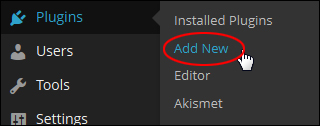
In the Install Plugins screen, type in "cleverness" into the search field and hit Enter on your keyboard ...
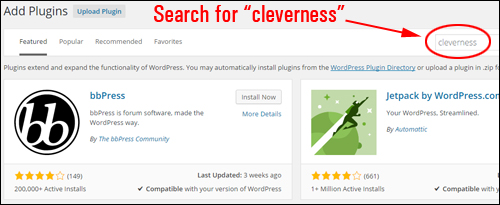
Locate the plugin in the Search Results area and click Install Now ...
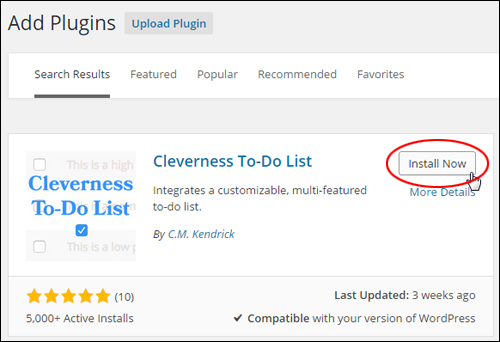
Click "Activate Plugin" ...
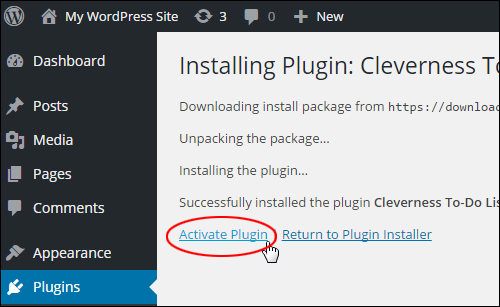
Note: You can also activate the plugin in the Plugins area ...

Once the plugin has been activated, click on Settings ...

Note: The 'Settings' screen can also be accessed by selecting To-Do List > Settings from your admin menu ...

This takes you to the 'Settings' area ...

The section below shows you how to go through the plugin configuration process ...
Cleverness To-Do List Plugin Configuration
The "To-Do List" plugin 'Settings' screen is divided into 4 tabs:
- To-Do List Settings - This area is where you can specify the main plugin settings.
- Advanced Settings - This tab lets you customize to-do lists, assign tasks to other users and perform database maintenance tasks.
- User Permissions - This tab is where you can configure user permissions and capabilities for Group and Master List types.
- Import/Export - In this section you can export and import to-do list data and plugin settings.
Let's now go through each of these sections.
To-Do List Settings
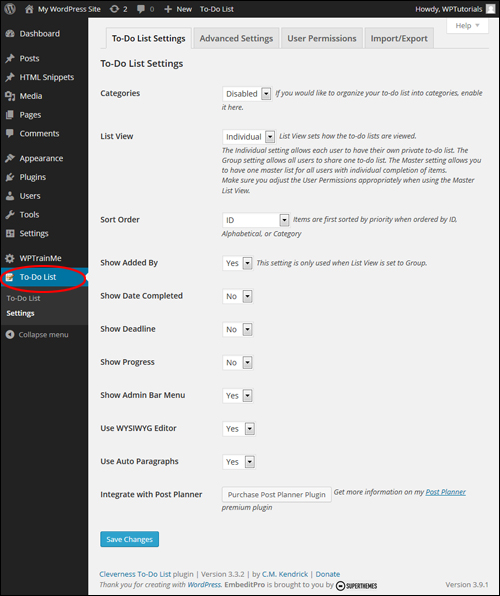
To-Do List Categories
Select 'Enabled' to organize lists into categories, otherwise leave this option set to 'Disabled'.
Note: If you enable this option, a 'Categories' item gets added to the To-Do List menu ...
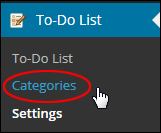
This lets you add categories that you can use to organize your lists (see 'Plugin Usage' section further below for more details) ...
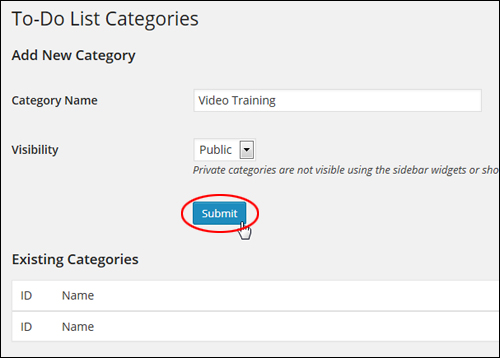
You can create 'public' and 'private' categories for your lists.
Categories set to 'private' will not be visible using sidebar widgets or shortcodes (only when 'Sort Order' is set to 'Category')
List View
List View allows you to choose how to-do lists are viewed. There are three kinds of to do list views you can select:
- Individual - Choose this option if you want each user to be able to create and manage their own private to-do list.
- Group - Select this option if you want all users to share one to-do list.
- Master - This option allows you to have a master list for all users, where users have their own individual items to complete. If using the 'Master' list view, make sure that you adjust the User Permissions appropriately in the 'User Permissions' tab (see further below).
Sort Order
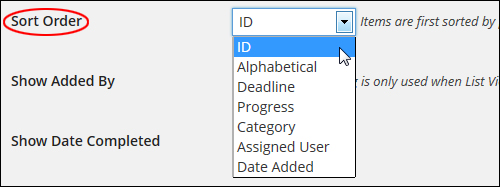
'Sort Order' lets you specify how to sort to-do list items.
If you select Category, Alphabetical or ID, Category, ID or Alphabetical options, items will be first sorted by priority.
Show Added By
Enabling this option lets you display which of your members has added an item to your to-do list.
Note: This setting only applies if 'List View' is set to 'Group'.
Show Date Completed
Enabling this option displays completion dates for your to-do tasks.
Show Deadline
If this option is enabled, you will be able to specify deadlines for your to-do items ...
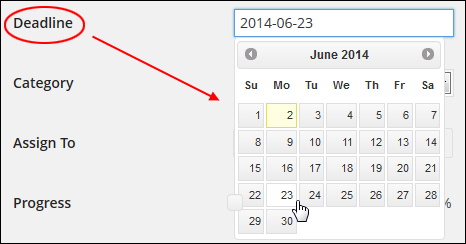
Show Progress
If enabled, you will be able to specify task progress indicators for your to-do items ...

Show Admin Bar Menu
If this option is enabled ('Yes'), the 'To-Do List' menu will display in your WordPress Dashboard Admin bar ...

Use WYSIWYG Editor
If this option is enabled, you can add and edit items on your to-do list using the WordPress WYSIWYG Editor ...
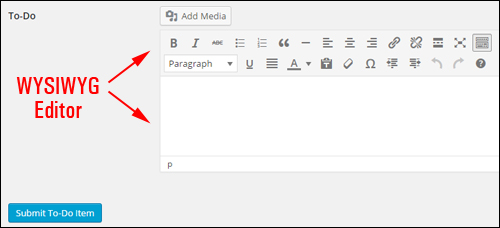
Use Auto Paragraphs
Enable this option ('Yes') to display content in to-do list items using paragraphs.
Integrate with Post Planner
If you are running a multi-author site or blog, you can integrate the Cleverness To Do List plugin with a plugin called WordPress Post Planner, from the same plugin developer to help make the process of managing a multi-author WordPress site easier ...
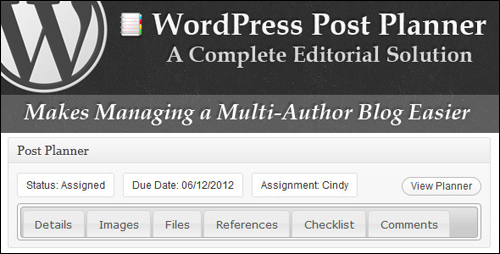
To learn more about using this WordPress plugin, go here: WordPress Post Planner - WordPress Multi-Author Publishing Plugin
After you have configured your plugin options in this section, click the 'Save Changes' button to update your settings ...

Advanced Settings
After you have configured the general settings, click on the 'Advanced Settings' tab to proceed ...

This brings you to the 'Advanced Settings' screen ...
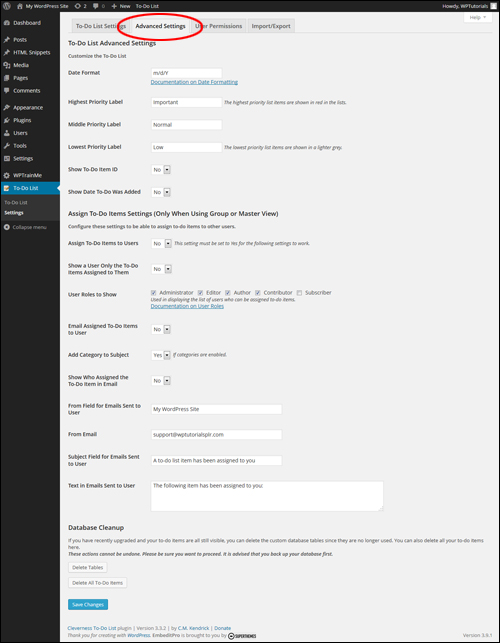
In this area you can customize your To Do lists, assign to-do tasks to other users and carry out database maintenance tasks.
Let's go through how to configure the plugin's 'Advanced Settings' section ...
To-Do List Advanced Settings > Customize The To-Do List
This section of the 'Advanced Settings' tab lets you customize your To-Do List ...
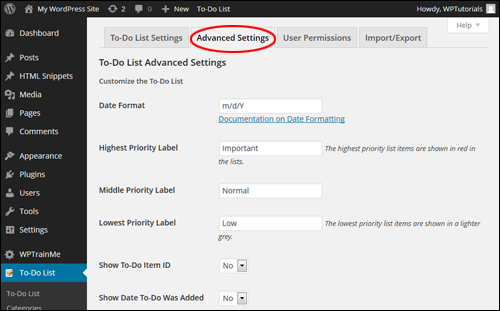
You can configure the following options in this section:
Date Format
In this section you can specify how to display dates in your to-do lists (e.g. month/day/year, day/month/year, etc.)
Note: To learn more about how to format dates in WordPress, refer to the date section of the WordPress Codex below:
WordPress Codex - Formatting Date And Time
Priority Labels
Here you can customize the labels for highest, middle and lowest priority items ...

Highest (important) priority items are shown in red in the lists and low priority items display in a lighter shade of grey ...
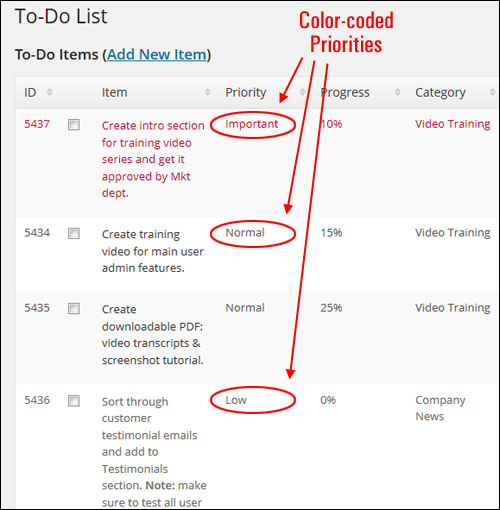
Show To-Do Item ID
If this option is enabled ('Yes'), item IDs show up on the to-do list ...
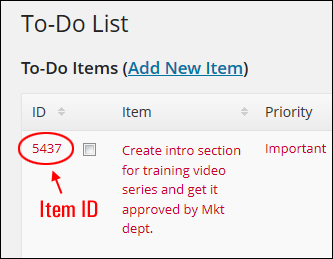
Show Date To-Do Was Added
Enabling this option ('Yes') displays the date the To-Do Items table was added ...
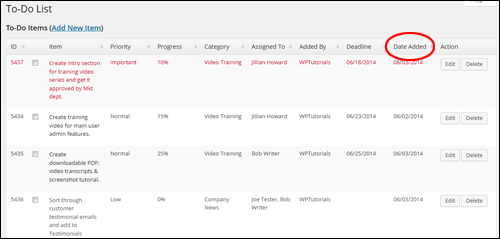
To-Do List Advanced Settings > Assign To-Do Items Settings
If you have chosen 'Group' or 'Master' View for your to-do list, you can configure the settings in this area and assign items to other users ...
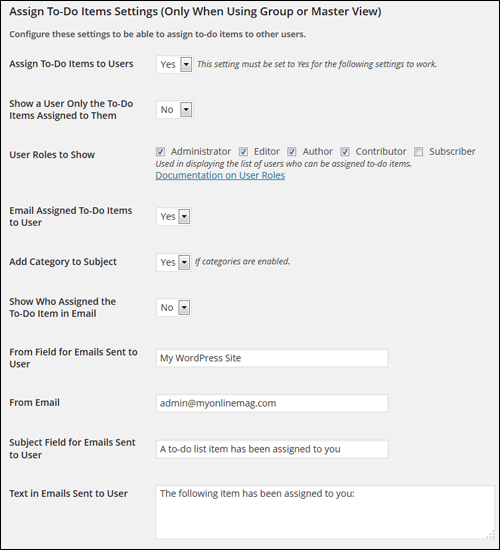
The following settings can be configured in this area:
Assign To-Do Items to Users
Enabling this option lets you assign tasks to other users ...
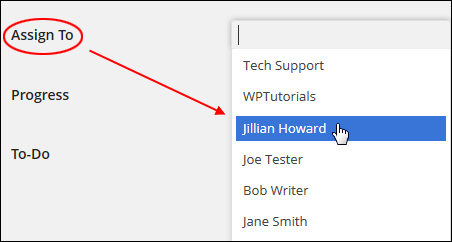
Note: This set this option to 'Yes' for the settings below it to work.
Show a User Only the To-Do Items Assigned to Them
Enabling this option lets you display to-do items only to users who have been specifically assigned those items. Leaving this option disabled will display items to all users.
User Roles to Show
Checking the boxes in this section Subscriber) displays the type of users that can be assigned todo items. If you don't want to assign to-do items to a particular role, then don't tick its checkbox.
Email Assigned To-Do Items to User
When you enable this option, WordPress will automatically send an email to users with their assigned to-do items ...
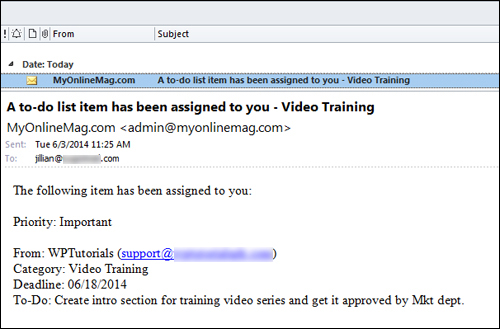
Leave this option disabled ('No') if you don't want emails sent out to users.
Note: If this option is disabled, skip the remaining settings in this section.
Add Category to Subject
If you have enabled categories in your plugin settings and select 'Yes' for this option, the to-do category will display on the subject of your emails ...
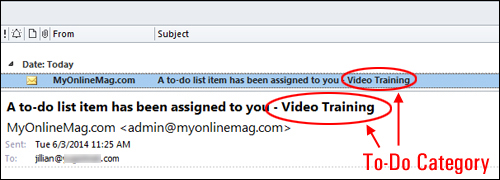
Leave this option disabled ('No') if you don't want to-do categories added to the subject of your emails.
If you don't want to-do categories added to the subject of your emails, then leave this option disabled ('No').
Show Who Assigned the To-Do Item in Email
Enable this option to display the user who assigned the to-do item in the email. This is a useful option if you have various project managers assigning to-do items to users ...

From Field for Emails Sent to User
This field lets you customize the "From" field when sending out email notifications to users. Type your company name, your domain, your name, or anything you like in this field ...

From Email
Enter the email address that you would like displayed as the "sent from" address ...

Subject Field for Emails Sent to User
In this field, add a subject field for the email that will be sent automatically to users when a new item has been added to your to-do list ...

Text in Emails Sent to User
Add the body of the email message that will be sent out automatically to users when a new item has been assigned to your to-do list.

To-Do List Advanced Settings > Database Cleanup
In this area of the 'Advanced Settings' tab you can perform database maintenance tasks associated with plugin data directly from your plugin settings area without having to access your web server ...

This function is useful if, for example, you see that old todo items are still displaying on your site.
The following tasks can be performed:
- Delete Tables - Remove custom database tables that are no longer being used.
- Delete All To-Do Items - Erase all to-do items.
![]()
Any database operations performed from this screen cannot be undone. If you are sure that you want to carry out database operations in this section, then remember to backup your WordPress database first.
If you don't want to back up your files yourself, then get professional help services, or use WordPress backup plugins. You can read about a great WordPress backup plugin that can fully automate your backup process here: Backup, Clone & Protect Your WP Website With Backup Creator Plugin For WordPress
User Permissions
Here you can configure user permissions and capabilities for Group or Master List types ...

![]()
If you have chosen the Individual List type, the only configurable item that is applicable for this section is the View To-Do List permission ...
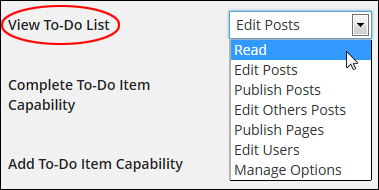
If you plan to configure user permissions and capabilities for Group or Master List types, select the highest level capabilities that you would like users to be able to perform for each option ...
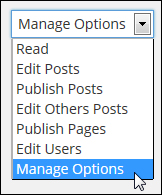
By default, general capabilities for each user role are configured as follows:
- Subscribers: Read
- Contributors: Edit Posts
- Authors: Publish Posts
- Editors: Edit Others Posts
- Administrators: Manage Options
Note: When working with the Master list type make sure that you only allow non-administrators to view and complete items, otherwise they will have the ability to edit the Master list.
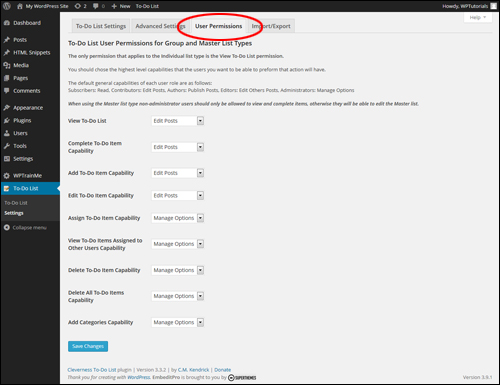
Below is a description of the settings for the User Permissions tab:
View To-Do List
This option allows the chosen capability to view to-do items in the dashboard widget and on the To-Do List page under the 'Tools' section.
Complete To-Do Item Capability
This option allows the chosen capability to mark items as completed or not completed.
Add To-Do Item Capability
Here you can permit the selected capability to add new items.
Edit To-Do Item Capability
This permits the chosen capability to modify existing items.
Assign To-Do Item Capability
This option permits the chosen capability to assign items to individual users.
View All Assigned Tasks Capability
This setting enables the chosen capability to view all tasks even if "Show Each User Only Their Assigned Tasks" is set to 'Yes'.
Delete To-Do Item Capability
Here you can allow the selected capability to delete individual to-do items.
Delete All To-Do Items Capability
This setting allows the selected capability to purge all the completed items.
Add Categories Capability
Here you can allow the selected capability to add new categories.
Import/Export
The ability to import and export to-do list data can be very useful. For example, you may decide to transfer data from an existing list to another website, or export the list data for backup or reporting purposes.
To access this function, click on the 'Import/Export' tab in your plugin settings area ...

Here you can easily export or import your list data and plugin settings ...
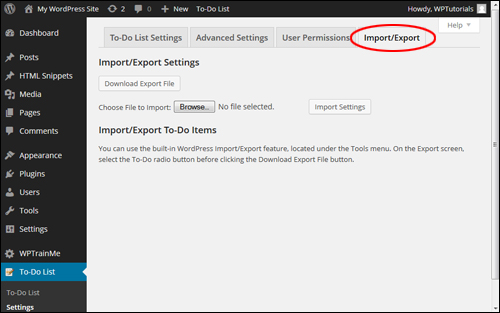
Exporting To-Do List Data
You can export and download your to-do list data settings by clicking on the 'Download Export File' ...

This opens up a new window allowing you to download and save your data in plain text format to an internal or external drive ...
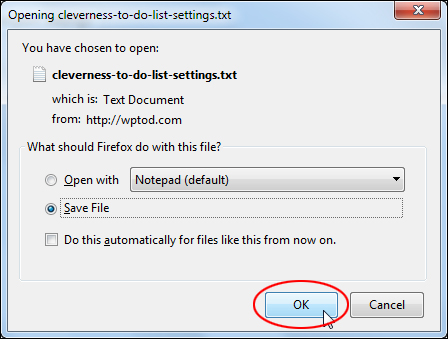
In addition to exporting list data from the 'Import/Export' section, you can also export data by going to your WordPress admin menu and choosing Tools > Export ...
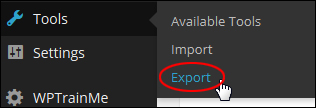
You can include to-do list data in a WordPress export file (in XML format), either by checking 'All content' (includes everything - posts, pages, etc...), or just select 'To-Do' from the 'Choose what to export' section and click on the 'Download Export File' button to download your file to your hard drive...
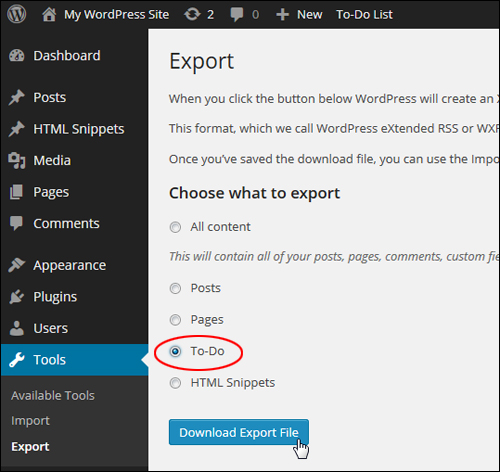
Importing To-Do List Data
Importing a list data file is easy. Just click on the 'Browse' button next to the 'Choose File to Import' field ...

Locate the file and click 'Open' ...
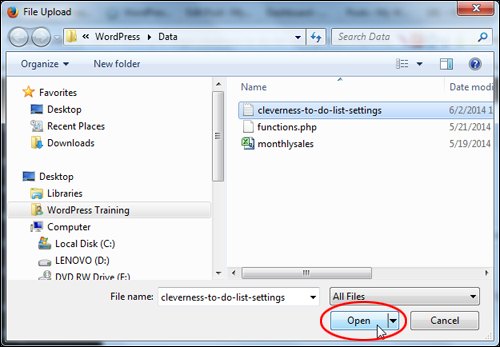
Once uploading the data file to your settings area, click on the 'Import Settings' button ...

Your file will be imported.
Now that you have configured all of the plugin settings, you are ready to start create and edit your lists.
How To Use The Cleverness To-Do List Plugin
To create a new to-do list, log into your WordPress admin, then go to the menu and click on To-Do List > To-Do List ...
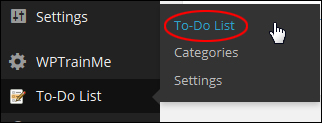
This brings up the 'To-Do List' page ...
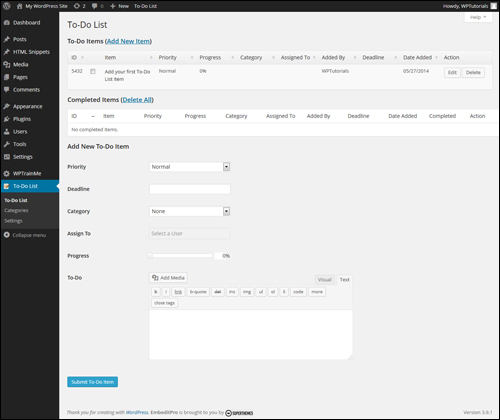
Adding New To Do Items
There are several ways to add a new item to your to-do list.
For example, you can add new to-do items to your list from your WP admin toolbar ...

You can also add a new item to your to-do list inside the Dashboard by clicking on the 'Add To-Do item' link ...
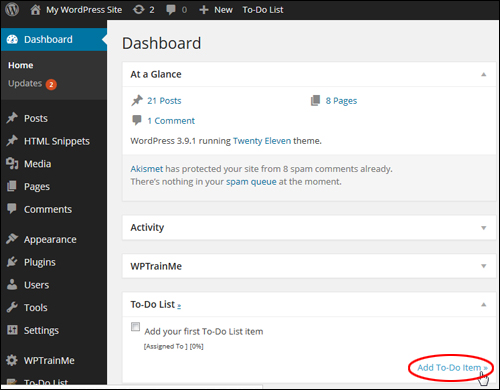
You can also click on the 'Add New Item' link in the 'To-Do Items' section (note: only use this option if your To Do list already contains many items, as the link is only going to send you to the "Add New To-Do Item" section down the page) ...

The methods shown above will take you to the 'Add New To-Do Item' section.
Depending on the way you have set up your plugin, some options may not display when adding new to-do items.
Select the options you have enabled for your to-do items, enter appropriate values and information into the relevant fields and click on the 'Submit To-Do Item' button to add the new item to your list ...
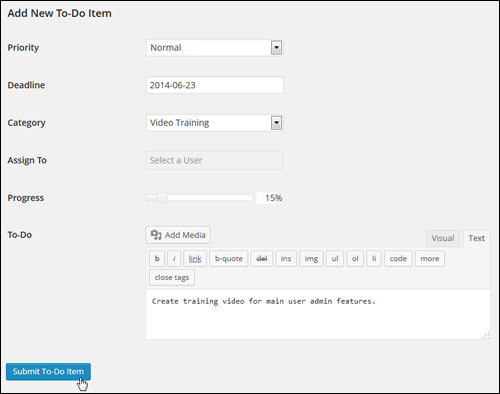
Note: If you have chosen a list type that allows you to assign tasks to specific users, select a user from the drop-down list and assign them the item ...
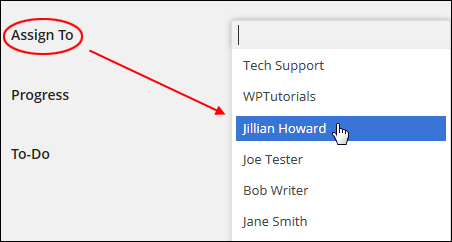
You can also make multiple users responsible for the same item (click on 'x' to remove a user) ...

Once an item has been added, it will be listed as an entry in the 'To-Do List' table ...

Repeat the above process to keep adding items to your list ...
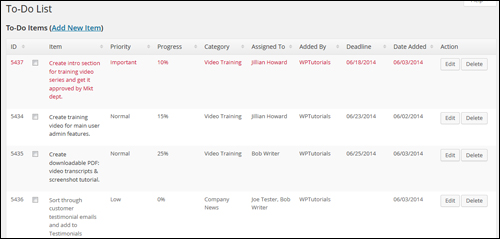
Edit And Delete To Do Items
To edit or delete an item, click on the 'Edit' or 'Delete' buttons associated with items under the 'Action' column ...

Depending on how you have configured the plugin (discussed earlier), users assigned to completing tasks may also receive an email notification in their inboxes ...
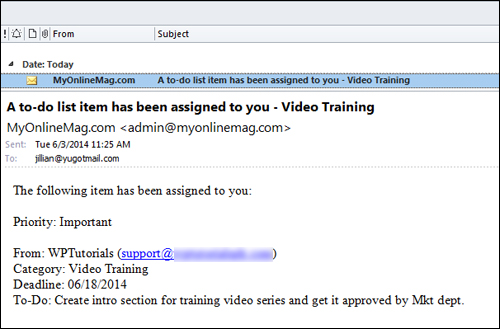
After creating your to do list, users can view it when logged into their own dashboard ...
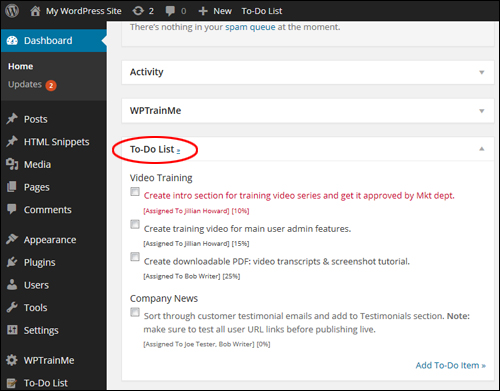
When the user assigned with completing an item ticks the item check box ...
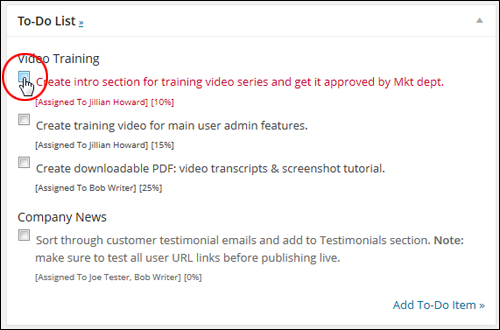
... the item disappears from the "To-Do" list ...
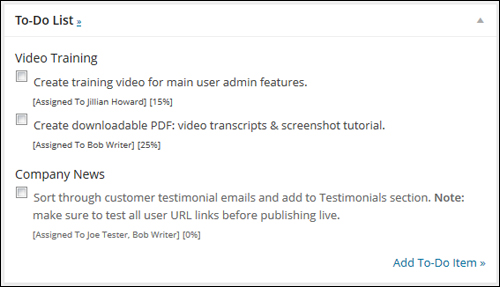
And gets added to the 'Completed Items' section located in the main screen of the 'To-Do List' plugin ...

Additional Information
The Cleverness plugin provides additional functions that let you display to-do lists on your site using widgets, and display a list on content inside a page or post using short codes.
Using The Plugin Widget
To add a to-do list to your site using widgets, go to the 'Widgets' page (Appearance > Widgets) and drag the 'To-Do List' widget to the menu location where you would like the list to display ...

Configure the widget settings and click 'Save' ...
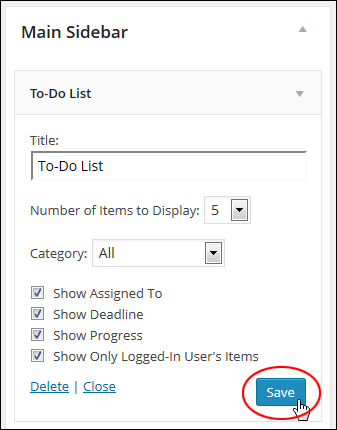
Your to-do list will now display on your site where you have placed the widget (i.e. the sidebar menu, footer, etc.)
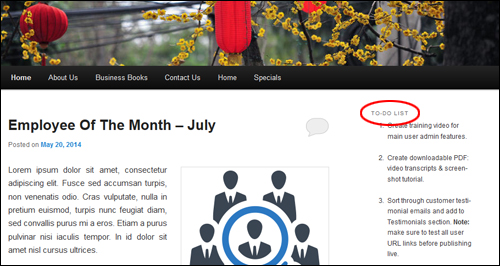
To learn more about how to use WordPress widgets, see the tutorial below: How To Use s
Using The Cleverness Plugin Short Codes
The Cleverness To-Do List plugin also lets you add lists on your site by inserting short codes into your content.
To access the documentation on using short codes, select To-Do List > To-Do List from your WordPress admin menu ...
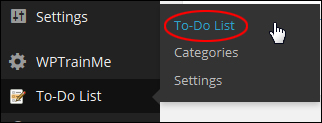
Click on the 'Help' tab on the corner of your screen ...
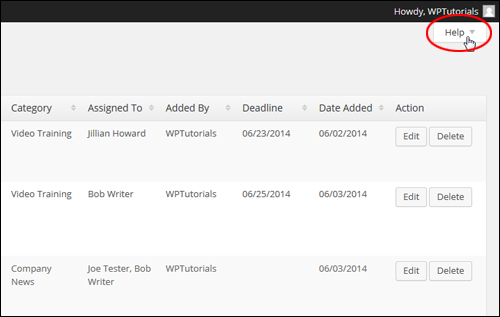
Click on the 'Shortcodes' menu entry to access the Shortcode Documentation section ...
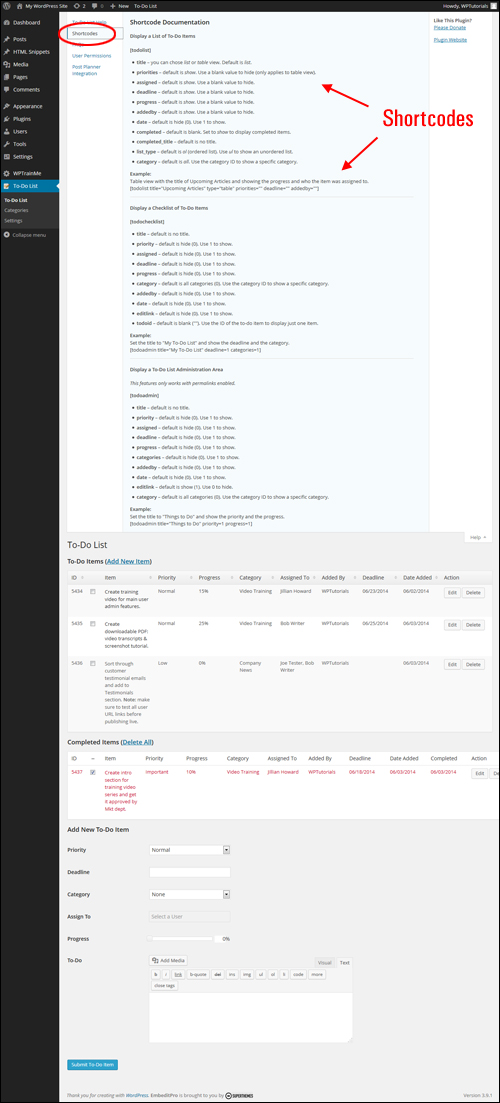
This documentation section explains different ways to configure and use shortcodes for displaying lists on your pages and posts.
Once you know what type of information you would like to add to your site, create a new post or page and either type or paste the shortcode inside the content section ...
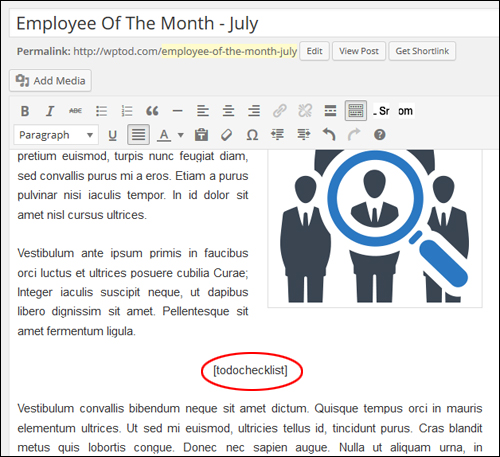
Publish your page or post and you should see the list displayed exactly where you have inserted the shortcode ...
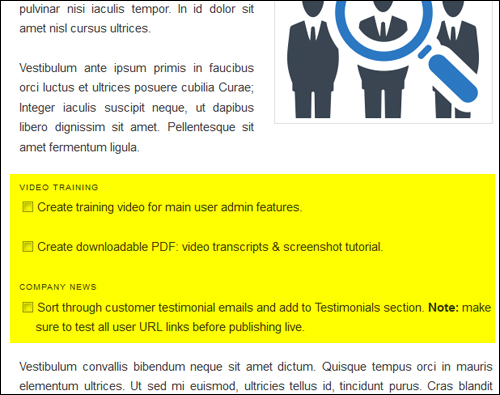
Visit this site for more details about this plugin: Cleverness To-Do List WordPress Plugin
Congratulations! Now you can add a to-do list in WordPress.
Discover more from Ultimate Virtual Solutions
Subscribe to get the latest posts sent to your email.


